Top 17 Marketing Automation Tools to Empower Your Team

Sometimes, the path of least resistance is the best one to take. Marketing is no different. Why spend countless hours breaking your back over repetitive tasks if there’s software that’ll do it for you?
In this article, we’ll detail the reasons why you should incorporate marketing automation tools into your processes and how to choose the right ones for your business. Discover the top 15 marketing automation platforms producing the best results for companies worldwide.
How Marketing Automation Tools Streamline Operations & Power Productivity
There are several aspects of your business that can benefit from marketing automation tools. Let’s dive right into the most meaningful stats and discuss why you should use automation software in your operations.
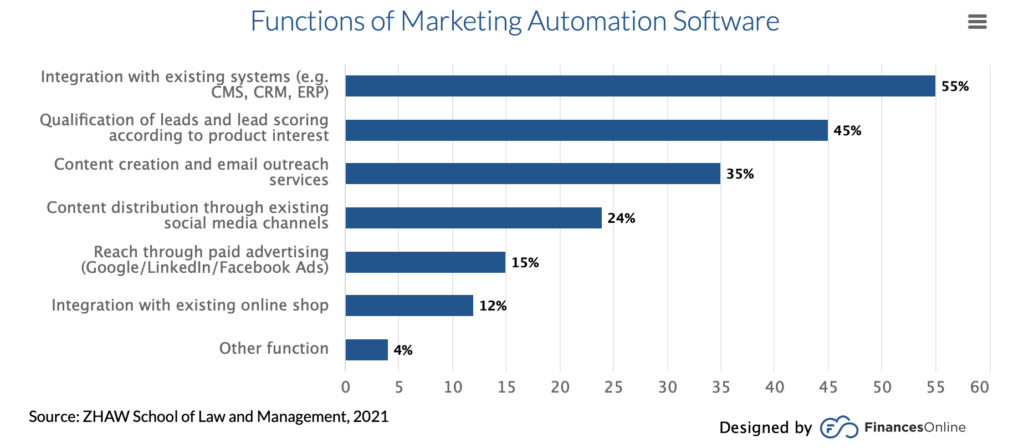
- Merge Tools to Create Streamlined Workflows: In 2021, ZHAW School of Management and Law found that 55% of marketing professionals most value marketing automation’s ability to unite CMS, CRM, and ERP tools into singular, streamlined workflows.
By bridging the gap between these tools, automation software minimizes the necessary labor involved in obtaining and sharing data, allows for uninterrupted productivity, and speeds overall task resolution. - Remove Barriers between Sales & Marketing: Marketing automation tools work incredibly well in eliminating information and workflow silos between the marketing and sales departments.
As these two departments are vital to your business’s bottom line, supporting their cooperation can do wonders for boosting your revenue across all channels. It guarantees a speedy return on investment with near -100% certainty. - Higher Conversion Rates & Customer Satisfaction: It’s not only your employees who benefit from marketing automation. By automating certain aspects of content creation and delivery aspects, you can also treat your leads and customers to better experiences than ever before.
Social media, phone, and email marketing automation help target people most likely to be receptive to your messaging with content they desire on the platforms they’re most comfortable using.
Top 15 Must-have Marketing Automation Tools to Supercharge Your Team
#1 CloudTalk | All-in-One Call Center Software
CloudTalk is a VoIP business calling solution used by customer service and sales teams. It automates workflows and gives managers the built-in analytics they need to optimize performance and increase calling efficiency.
With more than 70 features and a wide range of integrations with CRMs and helpdesk tools, CloudTalk collects, centralizes, and processes all calling data, allowing you to customize your CX to the exact specifications of your business.
Key Features:
- AI
- IVR
- ACD
- SMS
- Voicemail
- Click-to-Call
- Call Recording
- Call Monitoring
- Call Forwarding
- Real-time Analytics
- Workflow Automation
- Smart & Power Dialer
- 70+ 3rd Party Integrations
- 160+ International Numbers
- Multichannel Communication
Pricing: Starts at $25 per user/month.

#2 HubSpot Marketing Hub
With HubSpot Marketing Hub, you can drive revenue by targeting leads at the right place and time across email, landing pages, forms, and more. Manage your contacts and campaigns in one place and use automation tools to scale your efficiency. Build stronger relationships with your customers and reach better results.
We asked Tony Do, the Marketing Manager at Hubspot, if and how they use their product and what he sees as Hubspot’s biggest benefit. This is what he had to say:
“As a marketer for over 5 years, I’ve always been a huge of HubSpot’s tools, even before I became a HubSpot employee. HubSpot’s all-in-one solution has always been the biggest value factor for me and my campaigns.
Syncing your entire business operations under a single platform is a huge benefit, especially for startups and small businesses where you don’t have as much resourcing and bandwidth. I’ve been able to build websites on the CMS, onboard customers to email and subscription lists, and provide help using the customer service ticket system.
We can find ways to incorporate customers into our funnel, nurture leads, and develop deeper relationships with our customers. In traditional practices, it’s often that all of these processes live separately. But when you’re a one-person army, HubSpot’s marketing automation has been huge.”
Key Features:
- CRM
- Paid Ad Tracking
- List Segmentation
- Email Automation
- Workflow Automation
- Landing Page Creation
- Social Media Management
- Customizable Dashboards
Pricing: Offers a free version, paid plans start at $45 per month.
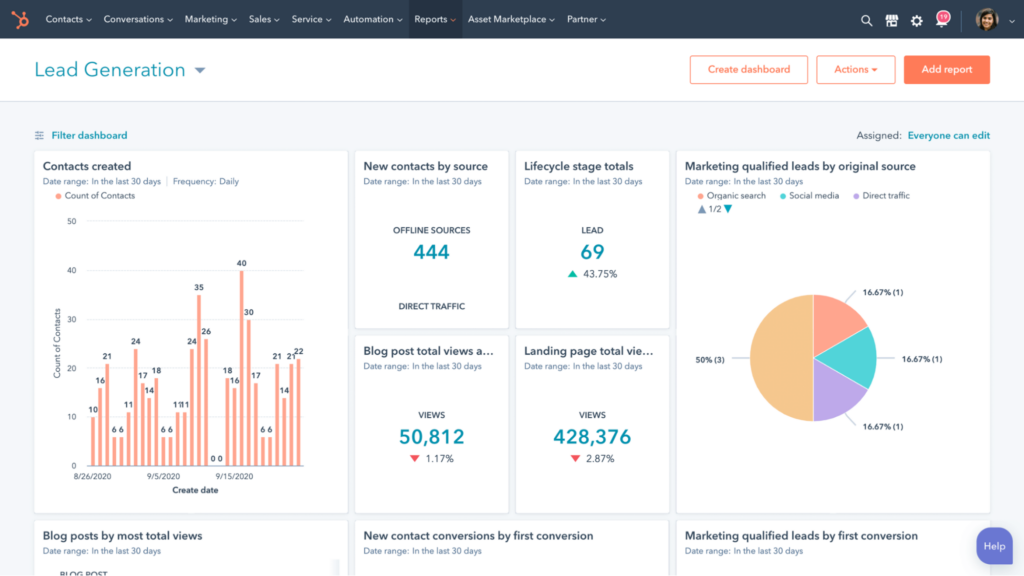
#3 Salesforce Marketing Cloud
The Salesforce Marketing Cloud is an all-encompassing CRM platform that revolutionizes customer relationship management and campaign execution. Its Journey Builder tool and seamless integration with Sales Cloud and Service Cloud allow businesses to deliver personalized experiences and streamline customer interactions.
It offers predictive analytics for informed decision-making with integrated solutions spanning customer journey management, email marketing, mobile engagement, social media integration, web personalization, targeted advertising, content creation, and data analysis.
Key Features:
- Analytics
- Website Designer
- Behavior Tracking
- Campaign Management
- Omnichannel Communication
Pricing: Starts at $400 per month.
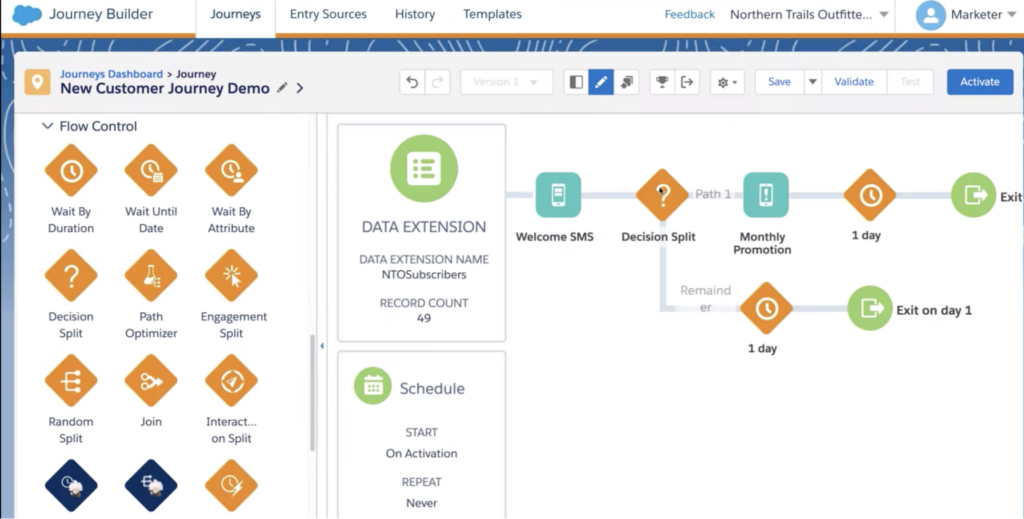
#4 Gong
Gong.io is a SaaS company that leverages artificial intelligence to analyze conversations and eventually enable sales departments to understand which marketing strategies are working and which aren’t.
The platform utilizes video, phone calls, and email data analysis to improve business insights. Artificial intelligence captures the trends and methods of top salespeople and helps create a training program for newer sales members to increase overall team production, lead generation, and deal closing.
Key Features:
- AI
- ACD
- Call Monitoring
- Collaboration Tools
- Sentiment Analysis
- Video Conferencing
- Reporting & Analytics
- Employee Scheduling
- Conversation Intelligence
- Automatic Outbound Dialer
Pricing: Per request.
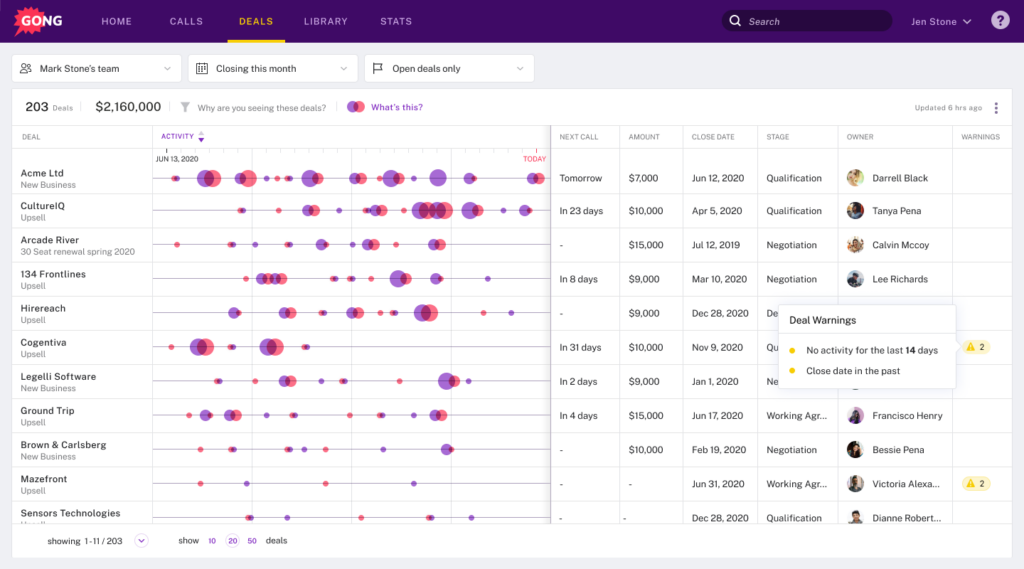
#5 Service Provider Pro
Service Provider Pro is an agency management tool that makes selling productized services easy. It targets agencies that have bundled their services into a services, and are ready to sell them to people who show interest. You can either add your services to an order form and show it to hot leads so they can purchase right away. Or, you create contact forms and use them for lead generation purposes on your website, social media, and other channels. Once they are ready to buy, simply invoice them.
Another major marketing feature is the built-in CRM tool. It allows agencies and outsourced marketing consultants to hold all relevant data about their leads and customers, be it the revenue they’ve generated, or custom data such as their LinkedIn profile.
We’ve asked Deian Isac, responsible for Marketing & Agency Success at SPP, how they use their own tool internally:
“We run our company mostly on Service Provider Pro, from the helpdesk module to answer support related queries to the CRM that holds valuable information about leads. For instance, I’ve added a CRM field to the client profile where I save the LinkedIn profile of our trials. We then connect with them to establish a personal relationship.”
“We also have multiple instances of our software running, depending on the need of it. For our link building efforts, we have a separate one to handle link building requests, talk to new partners, and more.”
Key Features:
- built-in CRM with custom fields
- native Zapier integration for automations
- webhooks and API for advanced automations
- white label form builder for checkouts and leads
- notifications via email, in-app, push
Pricing: Starts at $129/month billed monthly.
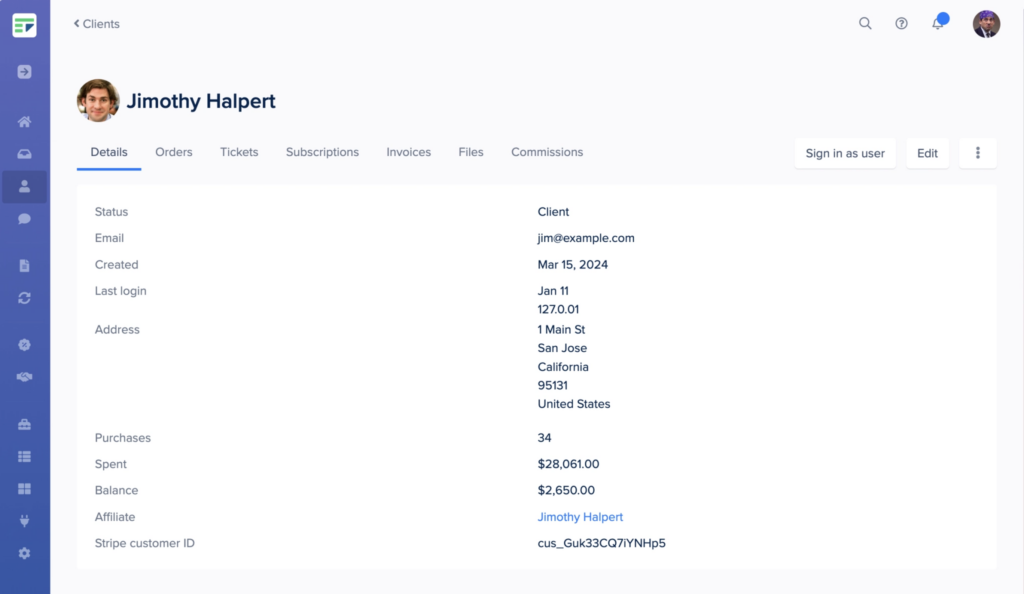
#6 SocialBee
SocialBee is a comprehensive platform designed to streamline social media management and automation, catering to the needs of marketing teams and entrepreneurs. The platform offers robust features for collaboration, content creation, scheduling, and analytics, addressing the constraints of limited budgets and time faced by small businesses.
Moreover, SocialBee provides offers an AI-powered Copilot and post generator solution. This tool helps users create a complete strategy—from planning to posting—while staying within budget. The AI-generated content ensures a constant flow of engaging posts tailored to the target audience’s preferences.
Key Features:
- AI Content Creation & Strategy
- Evergreen Posting
- Hashtag Generator
- Post Variations
- Post Location
Pricing: Starts at $29 per month.

#7 SleekFlow
SleekFlow is a robust omnichannel communication and marketing automation platform that streamlines customer interactions across various channels, including WhatsApp, Facebook Messenger, and more.
It’s a top-level Flow Builder that allows setting up automation rules, personalizing marketing broadcast messages, and creating multi-step workflows with the flexibility to integrate multiple platforms. The platform seamlessly integrates with CRM and e-commerce systems, offering a conversation AI feature for quality responses and in-depth analytics for performance assessment.
Key Features:
- Streamlined omnichannel communication
- Automated chatbot and flow builder
- Marketing broadcast messages
- Instant checkouts with in-chat payment links
- Seamlessly integrated CRM and e-commerce platforms
- Conversation AI feature for quality responses
Pricing: Starts with a free Startup plan, catering to start-ups and solopreneurs with essential features, plans start at $ 79 per month.
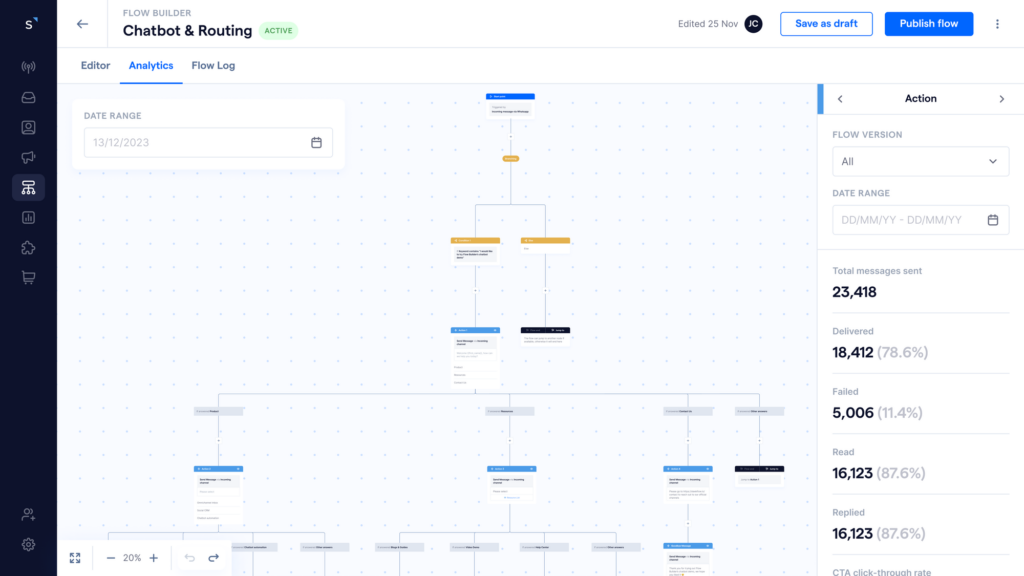
#8 ActiveCampaign for Marketing
ActiveCampaign is an integrated platform combining email marketing, automation, sales software, and CRM capabilities into a unified solution.
The solution empowers businesses to craft compelling email marketing campaigns and conduct web analytics to implement lead scoring and manage customer relationships.
Leveraging detailed behavior tracking and advanced marketing segmentation options, users can create highly personalized campaigns that resonate with their target audiences, driving engagement and conversion.
Key Features:
- CRM
- Split Testing
- Lead Scoring
- Email Marketing
- Site & Event Tracking
- Marketing & Sales Automation
- Dynamic Content Personalization
Pricing: Starts at $49 per month, paid annually.
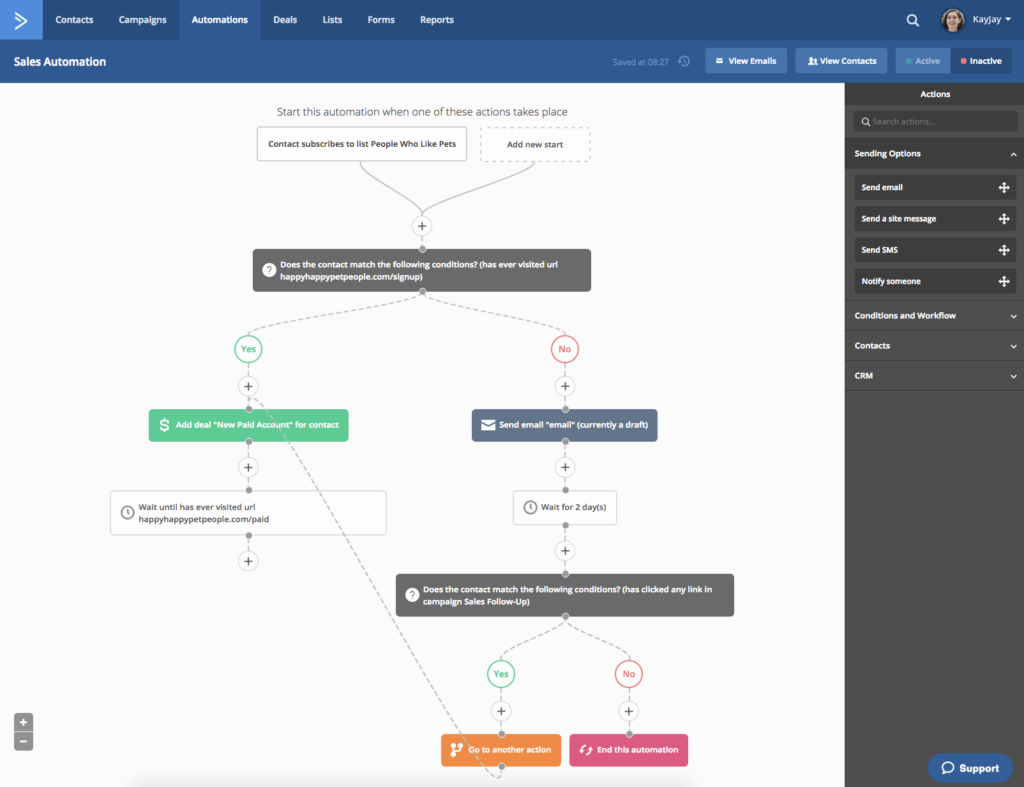
#9 SendX
SendX is an email marketing platform that allows companies, regardless of industry, to create comprehensive email campaigns, build lists, and automate their marketing.
Its automation features focus specifically on eradicating repetitive tasks, like cleaning up mailing lists, adding/removing tags, processing inbound data, and even triggering emails when a lead meets specific criteria.
This tool was suggested by Trevor Hatfield, the Founder of Inturact, so we were curious to hear what made him choose SendX in particular. This is what he had to say:
“We use SendX as a marketing automation tool for email campaigns. It helps smooth the sales process by focusing on lead nurturing and simplifies how you engage with potential customers. I was primarily persuaded to use the tool by its affordable pricing policy, ease of use, and exceptional customer support.”
Key Features:
- Autoresponder
- Email Campaigns
- Email A/B Testing
- Email Web Forms
- Audience Segmentation
Pricing: Starts at $7.49 per month, paid annually.

#10 Brevo (Formerly Sendinblue)
Brevo presents itself as an ideal email marketing solution for small and medium-sized businesses aiming to execute effective email campaigns while working within a limited budget. Its intuitive drag-and-drop email editor allows for effortless customization of email designs with a wide selection of pre-set elements.
The platform works for email and SMS and offers many valuable features, including A/B testing, landing page creation, bounce management, dynamic reports and analytics, and more.
Key Features:
- SMS
- Chatbot
- Facebook Ads
- Conference Calls
- Sign-Up Form Creator
- Landing Page Designer
Pricing: Offers a free version, plans start at $25 billed month.
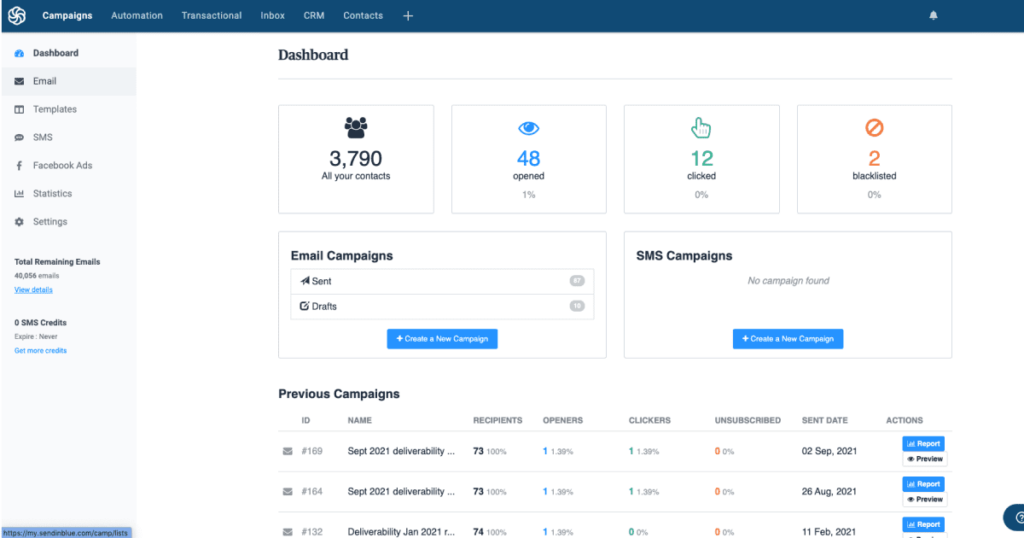
#11 Snov.io
Snov.io is an outreach automation and CRM software designed to help businesses manage an entire lead-obtaining journey on a centralized platform. Marketers can create personalized drip email sequences and campaigns using a drag-and-drop interface to connect with bloggers, instagram influencers, and media platforms.
The platform allows organizations to convert post-event or conference leads into clients by scheduling follow-up calls, tracking key metrics via visual statistics, and uploading email lists to verify them.
Administrators can search for emails on multiple domains and utilize the search functionality to retrieve corporate emails based on industry, company size, name, and more.
Key Features:
- AI
- Analytics
- Sales CRM
- Email Finder
- Email Verifier
- Email A/B Testing
- Email Drip Campaigns
Pricing: Offers free version, plans start at $30 per month.
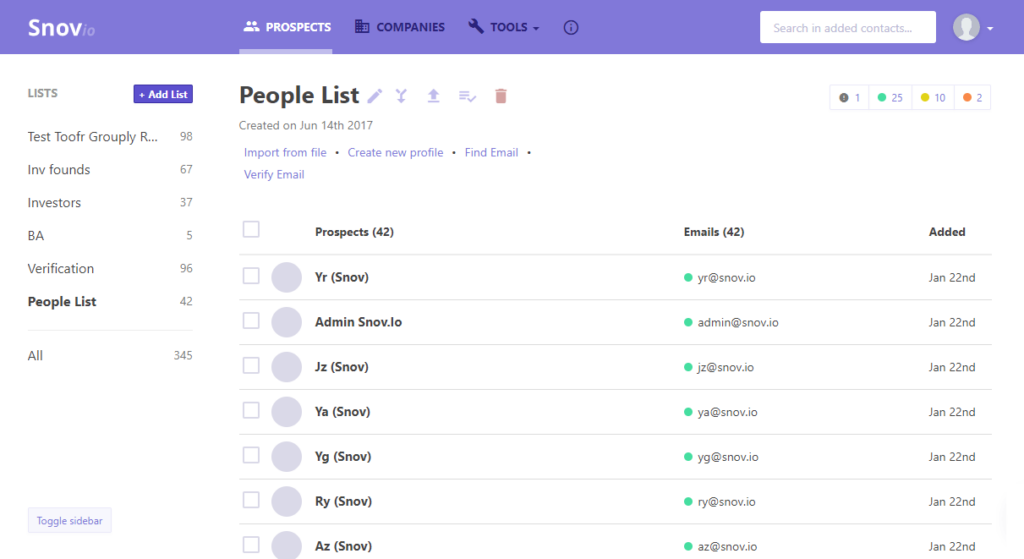
#12 Keap
Keap is a CRM platform that combines sales and marketing automation to create a great all-in-one platform for businesses just kicking off their marketing efforts. The platform lets you capture leads from tailored landing pages, increase conversions with powerful follow-ups, and automate repetitive sales processes.
Key Features:
- CRM
- Invoicing
- Automation
- A/B Testing
- Lead Scoring
- Internal Forms
- Text Marketing
- Landing Pages
- Email Marketing
- Recurring Payments
- Reminders & Reports
- Appointment Scheduling
Pricing: Starts at $189 per month or $149 per month if paid annually.
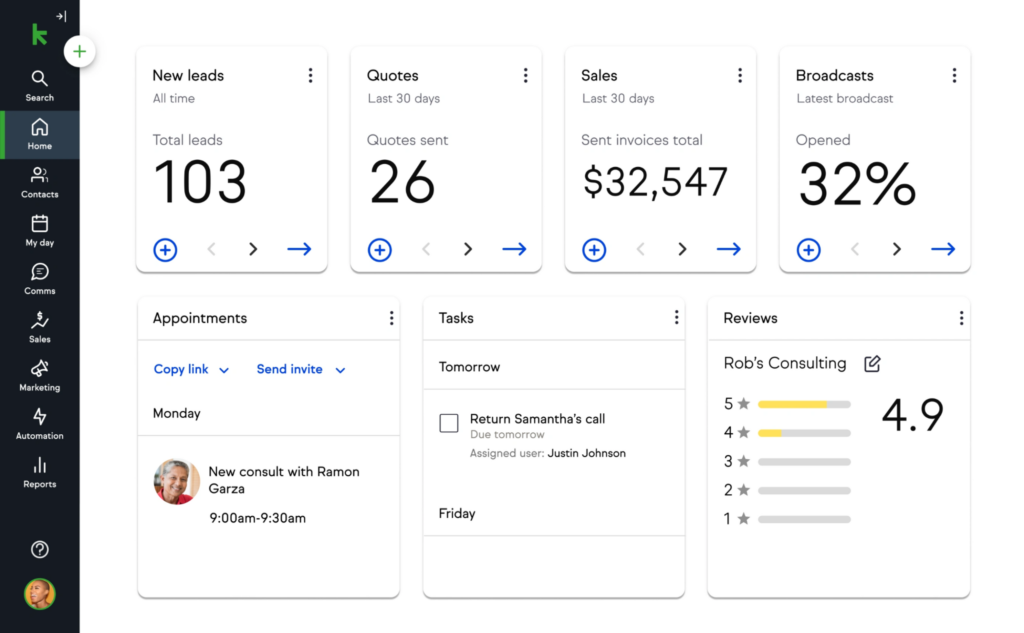
#13 Klaviyo
Klaviyo unifies all customer data and channels in one place, delivering unprecedented speed and value. It is built to be intuitive and easy to use so that every brand can easily connect with its valued customers.
The platform allows eCommerce store owners to deliver a personalized multi-channel customer experience, send bulk email and SMS campaigns, and take full control of all their content and messaging in one place.
Key Features:
- SMS
- Reviews
- Mobile Push
- Signup Forms
- Social Media Ads
- Pre-built Templates
- Campaign Newsletters
- Ecommerce Automation
Pricing: Offers a free version, plans start at $45 per month.
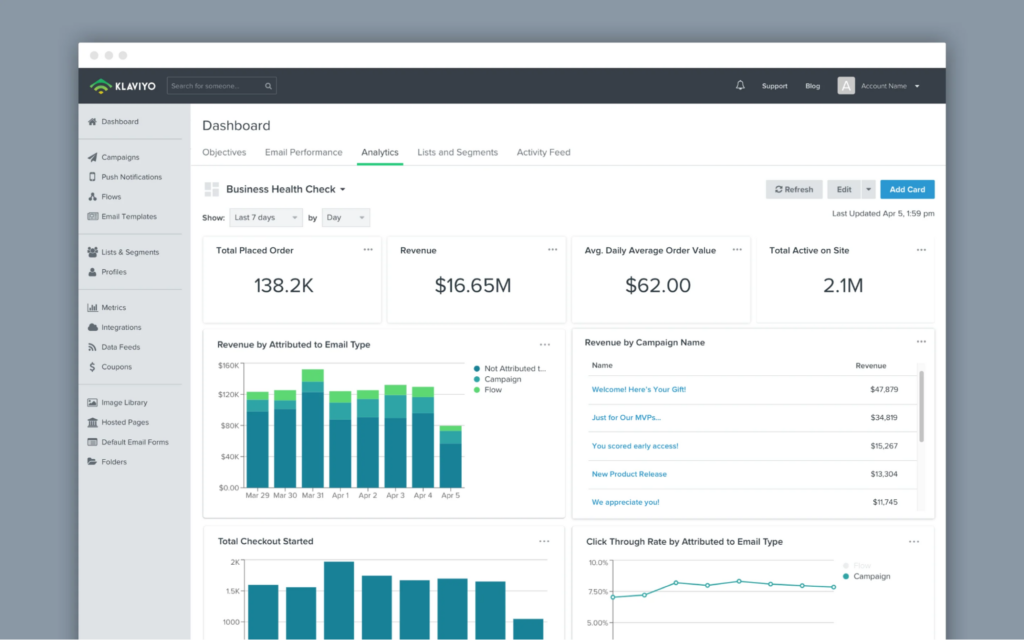
#14 MailChimp
Mailchimp is an email and marketing automation platform for growing businesses. Today, it stands as one of the most popular email automation tools on the market.
Mailchimp has a wide range of features, but most notably, it allows you to manage subscription lists, create email campaigns, automate customer journeys, and track your performance.
Key Features:
- A/B Testing
- Email Builder
- Generative AI
- Marketing CRM
- Email Marketing
- Content Optimizer
- Campaign Manager
- Behavioral Targeting
- Smart Recommendations
- Customer Journey Builder
- Landing Page & Website Designer
Pricing: Offers a free version, plans start at $13 per month.
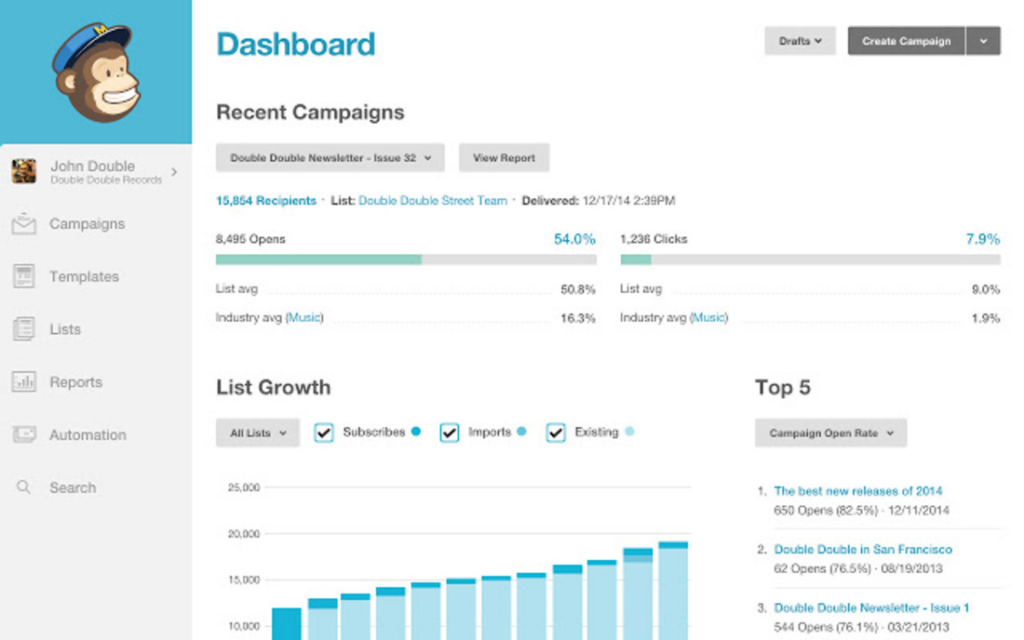
#15 Ortto
Ortto is, first and foremost, a Customer Data Platform (CDP) built to help you increase the impact of your campaigns and hit growth goals with real-time customer data insights. On top of that, the platform offers solutions for customer journey building, email & SMS marketing, multi-channel communication, and more.
We asked Charlie Windschill, the Director of Growth Marketing at Orto, whether they used their own tool in their processes and what he saw as its biggest benefit. This is what he had to say:
“We use our product, Ortto (formerly: Autopilot), internally for marketing automation across the entire customer lifecycle. For example, we run integrated campaigns gathering leads via forms created in Ortto and 3rd party forms (e.g., LinkedIn Lead Gen Forms), trigger automation to keep Salesforce and the Ortto CDP updated, send emails related to the campaign plus move leads into appropriate evergreen nurture Journeys.
We also have a product-led growth motion, so use our product to activate, engage and convert users on a free trial based on their product usage behaviors which we track with custom events set up in Ortto.
Finally, as the head of the marketing department, I have all my reporting set up in Ortto, which I use for reporting up and across the organization on how we’re trending toward goals and why.
We think users most value the ability to access marketing automation, CDP, and analytics in one simple-to-use solution. Furthermore, Ortto leverages the power of AI to offer relevant content recommendations, helping save time.”
Key Features:
- A/B Testing
- AI Predictions
- Web Push Notifications
- Form & Pop-Up Builder
- Email & SMS Marketing
- Mobile Push Notifications
- Customer Journey Builder
- Email Delivery Optimization
Pricing: Starts at $509 per month, billed annually.
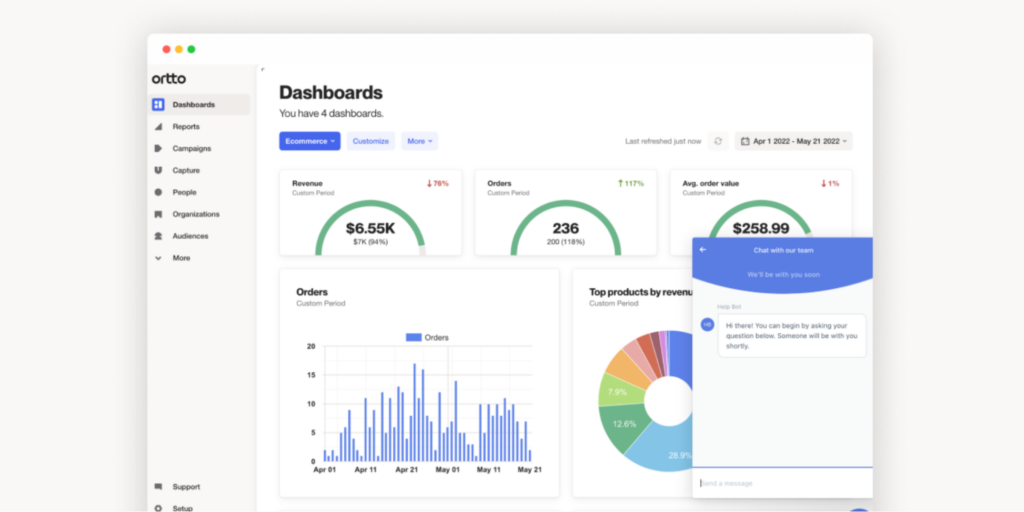
#16 Fliki’s AI Video Generator
Fliki’s AI video generator allows content creators to transform text into engaging AI-generated videos. Fliki’s features include realistic AI avatars, natural text-to-speech, and powerful video creation capabilities that bring ideas to life with minimal effort.
Whether you’re working with scripts, blogs, tweets, or product descriptions, Fliki automates the video creation process, seamlessly integrating visuals, subtitles, music, and transitions. This not only saves time and helps content creators to monetize their ideas, but also ensures professional-quality output, making it an invaluable asset for marketers, educators, and social media enthusiasts.
Key Features:
- Realistic AI avatars
- Natural text-to-speech
- Script and blog transformation into videos
- Integration of visuals, subtitles, music, and transitions
- Customizable AI voices and avatars
- AI media selection for contextual visuals
- No special software or technical skills required
Pricing:
Fliki offers a free plan that allows users to generate AI videos without requiring a credit card. For more advanced features and capabilities, Fliki provides various paid plans tailored to different needs and budgets.
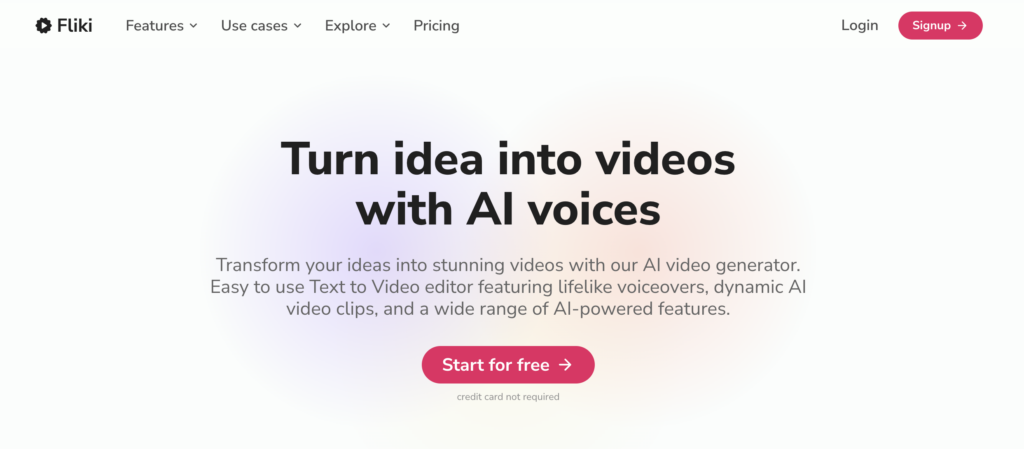
#17 Moosend
Moosend is a versatile email marketing and marketing automation solution that offers powerful features like no-code builders, an AI writer, and transactional emails within a single platform.
Designed to help businesses engage their audiences with targeted email campaigns, Moosend provides an intuitive interface, a wide variety of templates, and real-time analytics to track audience interactions and campaign performance.
With robust automation workflows, advanced segmentation, and personalized product recommendations, Moosend helps you deliver professionally designed, engaging newsletters that maximize your ROI.
Key Features:
- Drag-and-drop builder
- Ready-made automation flows
- Build-in AI writer
- Website tracking
- A/B testing and spam tests
- Lead generation tools
- Advanced reporting and analytics
Pricing:
Moosend offers a 30-day free trial, while prices start at $9/month for the Pro plan. Moosend also offers Moosend+, a custom plan that allows users to enjoy all Pro features and select enterprise-level add-ons, based on their needs.
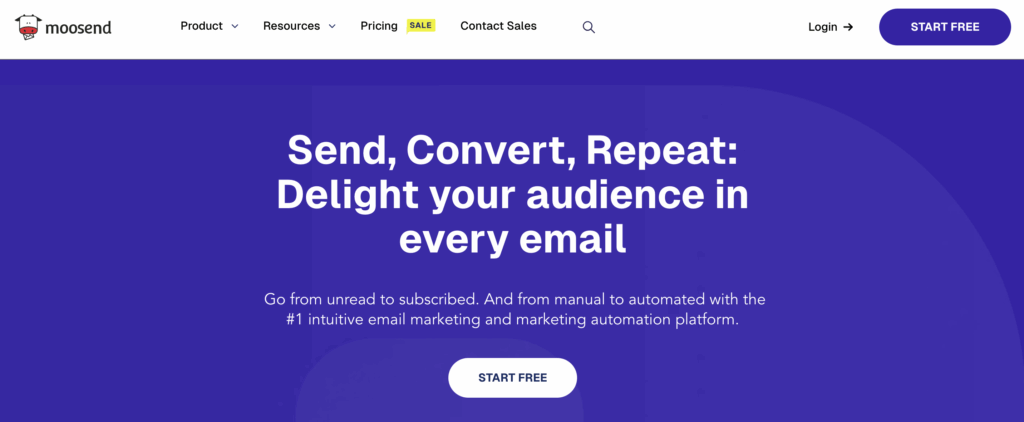
How to Choose the Right Marketing Automation Tools
If you still have no solid idea of what you need to improve and how you want to approach it, the money and effort you spend may be for nothing. To prevent that, we’ve compiled these five simple steps for choosing the right marketing automation tools for you.
- Identify Bottlenecks in Your Operations
Are you not getting the desired results from the resources you invest in a particular team or project? Do you continue to fail company KPIs or fall below industry-wide benchmarks? If so, there’s something wrong with your processes.
Most companies can’t immediately recognize what tools would be right for them because they don’t understand the root of their issues. Finding out should be your first step.
Once you figure it out, you’ll be able to ascertain what aspects of your business would benefit from marketing automation tools and which ones are the best pick. Almost.
- Determine Your Budget
The last step necessary before actually starting to look for solutions is to determine your budget.
Start by assessing your financial resources and compare them against the initial purchase price and the expected costs of implementation, training, and long-term use of the tool.
Don’t forget to consider scalability – you want to choose a tool that can grow alongside your business. To that end, find a solution that fits your business now as well as in the future.
- Do Your Due Diligence
Finally, we’re moving on to actually choosing the solution in your desired niche and finding the one that fits you. Review platforms such as G2, Capterra, SaaSHub, and TrustRadius will be your best friends during this process.
Compare the tool providers’ sales pitches with actual experiences from people in similar industries with similar needs. Remember, star ratings aren’t everything, but they’re always a good place to start when eliminating possible contenders.
- Look for Measurability
How can you know whether the tool is doing its job if you don’t have data to evaluate it? Providers of marketing automation platforms that are confident in their tools typically provide you with an analytics solution, so you can track your progress.
Thus, when choosing new automation software, it’s always a good idea to look for one with strong statistics. It’ll help you gauge how well your money is being spent and immediately alert you if someone’s trying to pull the wool over your eyes.
- Contact Sales & Try It Out for Yourself
Once you found a marketing automation tool that seems right for you, it’s time to bite the bullet and give it a try. But before you spend a cent on it, it’s always good to subscribe for a free trial and see if it fulfills your requirements.
If there’s no free trial mentioned on the solution provider’s website, we recommend you contact their sales team and ask them to give you one anyway. Usually, they’ll be more than happy to let you experience their product.
If not, it might be a sign that there’s something they don’t want you to see before getting your money.
What did you find in this article?
What are marketing automation tools?
Marketing automation tools are software platforms that help businesses automate and streamline their marketing processes – repetitive tasks, manage marketing campaigns, track customer interactions, and analyze data to optimize marketing efforts.
How to compare marketing automation tools?
When comparing marketing automation tools, consider factors such as features and functionality, ease of use, scalability, integration capabilities with other software systems (such as CRM), pricing, customer support, and user reviews. Assessing these factors will help you choose a tool that aligns with your business needs and goals.
Why use marketing automation tools?
Marketing automation tools offer numerous benefits, including improved efficiency and productivity, personalized customer experiences, lead generation and nurturing, targeted and segmented marketing campaigns, better data tracking and analysis, and the ability to automate repetitive tasks, saving time and resources.
What industries use marketing automation tools?
Marketing automation tools are used across various industries, including e-commerce, technology, finance, healthcare, B2B services, retail, travel, and hospitality. Any business that engages in marketing activities can benefit from utilizing marketing automation tools to streamline its processes and drive results.
What is an example of marketing automation?
An example of marketing automation is sending personalized email campaigns triggered by specific customer actions or behaviors, such as abandoned cart reminders, welcome emails, or targeted follow-up messages based on previous interactions. These automated campaigns help nurture leads, improve customer engagement, and drive conversions.
What is CRM marketing automation?
CRM marketing automation refers to the integration of marketing automation tools with customer relationship management (CRM) systems. It allows businesses to combine customer data and marketing activities, enabling personalized marketing campaigns, lead management, and streamlined communication across the customer lifecycle.
What should I look for in a marketing automation tool?
When choosing a marketing automation tool, consider factors such as ease of use, scalability, integration capabilities with your existing systems, robust reporting and analytics, campaign management features, lead generation and nurturing capabilities, personalization options, and responsive customer support. It’s important to select a tool that aligns with your specific marketing goals and strategies.
























